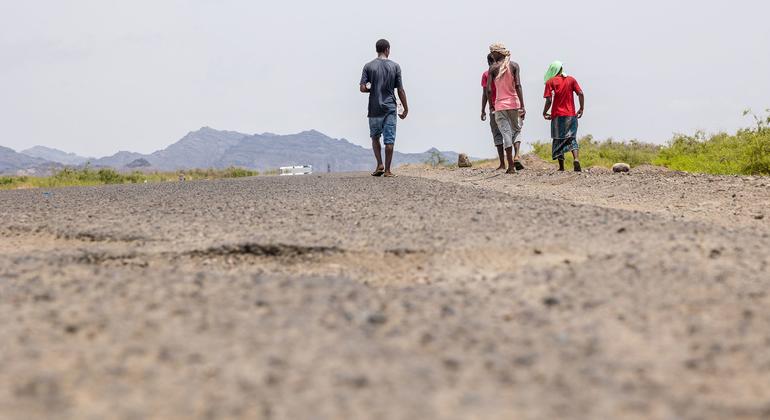Her trip to humanitarian work began after years to serve in hospitals in Aden, where she witnessed the struggles that vulnerable communities are faced with access to health services.
“In Aden, I worked in a private hospital,” she recalls. “I found that many people could not afford treatment. This reality pushed me to find a way to help those who are left behind. ”
She decided to move to Ma’rib, a city hundreds of thousands of people displaced by the conflict and a key transit center for migrants making the perilous journey from the horn of Africa through Yemen, with a clear objective in mind: to serve those who could not afford medical treatment.
“The migrants who come to us are traumatized”
Dr. Nouf said that she had found her call to the center, which provides primary health services to vulnerable groups, especially those in motion.
“The migrants who reach us are traumatized,” she said. “Whether it is hunger, fear of death or the unknown, it results in physical, psychological or neurological shocks.”
Dr. Nouf performs an initial examination to assess his patient’s health.
Many arrive with serious, sometimes permanent injuries. Women in particular often wear visible and invisible scars of sudden abuses along the irregular migration routes in the country.
“There are times when I fight emotionally with what I see and hear,” she said. “But, help these people and watch them recover my passion and my determination to continue. »»
By listening to their stories filled with pain, fear and resilience, Dr. Nouf does everything it can to help, assessing each case, providing emergency support and, if necessary, to refer patients to specialized services. From the treatment of contagious diseases to take care of physical and psychological trauma, MRP also offers protective services for survivors and victims who have experienced violence, exploitation and abuse. »»
From young migrant to aid worker
Dr. Nouf is not the only one in this mission of providing vital assistance to migrants and Yemenis in need. She works with a dedicated team of colleagues from various backgrounds who relentlessly take care of many patients every day, including Khalid, a 22 -year -old Ethiopian whose own migration trip to Ma’rib is a testimony to resilience and compassion.
Khalid arrived in Yemen in 2021, his heart broken after his school in Ethiopia refused to let him return due to an absence linked to the disease. Frustrated, he left Ethiopia with smugglers, enduring an exhausting trek of 10 days in the desert and surviving on shared cookies. When he arrived in Aden, he found no comfort or help, then he continued his trip to Ma’rib where some of his relatives live.
Once in Ma’rib, Khalid was welcomed by his community, which brought him clothes and welcomed it. A month later, he started working as a cleanser in a local hospital, a job he held for three years.
‘I had the same experience’
In the hospital, Khalid met with other migrants looking for treatment and pleaded for their care. He spoke with administrators, exhorting them to treat these vulnerable people free of charge. His reputation grew up, and soon anyone in need turned to Khalid to get help.
“I help other migrants because I had the same experience,” he said. “I know how support can be less suffering.”
Finally, Khalid had the opportunity to work in the MRP, where he can help migrants access the services and provide translation support.
“People arrive here suffering from bad nutrition, amibiase and malaria. Some have physical injuries caused during ransom torture in the hands of traffickers, “he said. “I am grateful to donors who operate this establishment. He saves lives every day through vital health services. ”
Originally published at Almouwatin.com








